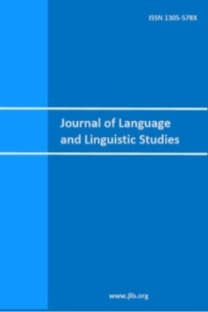Student questioning in literature circles: An investigation of forms of questioning among ELT students
Öz
Please fill up the following information accurately. (Please
use Times New Roman, 12 pt.
Student questioning in literature circles: An investigation of forms of questioning among ELT students
In this study, different types
of questions being asked by two groups of ELT freshmen while conducting
literature circles, one of the most useful ways to activate cooperative
learning among the students, were put
under a close scrutiny. The first group comprised of thirty-seven students
who had directly passed the proficiency exam of the university, while the
latter consisted of the thirty-five students who studied at the preparatory
school for a year. The different types of questions posed by the questioners in each circle were analyzed. According
to the findings, there was no significant difference between the students who
studied at the English preparatory school for a year, and the ones who
directly passed the proficiency exam of the university. In both groups,
product questions were the most frequent type of questioning, while metaprocess
questions remained the least used types in both literature circles.
Information about Author(s)*
Author 1
Author
(Last name, First name)
Andarab, Mehdi Solhi Affiliated
institution (University)
Istanbul Medipol UniversityCountry
Turkey
Email
address
Solhi.mehdi@gmail.comDepartment
& Rank
English Language Teaching, Ph.D.Corresponding author (Yes/No)
Write only one corresponding author.
Author 2
Author
(Last name, First name)
Kesen Mutlu, AynurAffiliated
institution (University)
Istanbul Medipol UniversityCountry
Turkey
Email
address
aynur.kesen@gmail.comDepartment
& Rank
English Language Teaching, Ph.D.Corresponding
author (Yes/No)
Author 3
Author
(Last name, First name)
Affiliated
institution (University)
Country
Email
address
Department
& Rank
Corresponding
author (Yes/No)
Author 4
Author
(Last name, First name)
Affiliated
institution (University)
Country
Email
address
Department
& Rank
Corresponding
author (Yes/No)
Anahtar Kelimeler:
Choice, product, process, metaprocess questions
___
Almeida, P., & Neri de Souza, F. (2010). Questioning profiles in secondary science classrooms. International Journal of Learning and Change, 4(3), 237–251.Almeida, P., Pedrosa de Jesus, H., & Watts, M. (2008). Developing a mini-project: students’ questions and learning styles, The Psychology of Education Review, (32), 6–17.
Anderson, L.W., Krathwohl, D.R., Airasian, P.W., Cruikshank, K.A., Mayer, R.E., Pintrich, P.R., Raths, J., & Wittrock, M.C. (2001). A taxonomy for learning, teaching, and assessing: A revision of Bloom’s Taxonomy of Educational Objectives. New York: Longman.
Arslan, M. (2006). The role of questioning in the classroom. Hasan Ali Yücel Eğitim Fakültesi Dergisi, 2, 81–103.
Bajrami, L. (2015). Teacher's New Role in Language Learning and in Promoting Learner Autonomy. Procedia - Social and Behavioral Sciences, 199, 423–427.
Chatelier, S., & Rudolph, S. (2018). Teacher responsibility: shifting care from student to (professional) self?, British Journal of Sociology of Education, 39(1), 1–15.
Chin, C. (2007). Teacher questioning in science classrooms: Approaches that stimulate productive thinking. Journal of Research in Science Teaching, 44(6), 815–843.
Cook-Sather, A. (2010). Making Space for Learning. An essay review of what the best college teachers do. Curriculum Inquiry, 40(2), 283–293.
Coutinho, M., & Almeida, P. (2014). Promoting student questioning in the learning of natural sciences. Procedia - Social and Behavioral Sciences, 116, 3781–3785.
Doherty, J. (2017). Skillful Questioning: the beating heart of good pedagogy. Retrieved February 5, 2018, from https://impact.chartered.college/article/doherty-skilful-questioning-beating-heart-pedagogy/
Floyd, W.D. (1960). An Analysis of the Oral Questioning Activities in Selected Colorado classrooms. Colorado State College, Colorado, USA.
Graesser, A., & Olde, C. (2003). How does one know whether a person understands a device? The quality of the questions the person asks when the device breaks down. Journal of Educational Psychology, 95, 524–536.
Graesser, A., & Person, N. K. (1994). Question asking during tutoring. American Educational Research Journal, 31(1), 104–137.
Harlen, W., & Qualter, A. (2004). The Teaching of Science in Primary Schools. London: David Fulton Publishers.
Hastings, S. (2003) Questioning, TES Newspaper, 4 July. Retrieved February 5, 2018, from https://www.tes.co. uk/article.aspx?storycode=381755
Heritage, M., & Heritage, J. (2013). Teacher questioning: The epicenter of instruction and assessment, Applied Measurement in Education, 26(3), 176–190.
Kumaravadivelu, B. (2003). Beyond Methods: Macrostrategies for Language Teaching. Yale University Press.
Long, M., & C. Sato (1983). Classroom foreigner talk discourse: Forms and functions of teachers’ questions. In H. Seliger and M. Long (eds.), Classroom-oriented Research in Second Language Acquisition. Rowley, Mass.: Newbury House, 268–285.
Martinho, M., Almeida, P. & Teixeira-Dias, J.J.C. (2012). Students’ questions in Higher Education chemistry classes according to their gender. Procedia – Social and Behavioral Sciences, 47, 835–840.
Nunan, D. (1989). Understanding Language Classrooms. Hemel Hempstead: Prentice Hall.
Pizzini, E.L., & Shepardson, D.P. (1991). Student questioning in the presence of the teacher during problem solving in science, School Science and Mathematics, Vol. 91, 348–352.
Qashoa, S. H. (2012). Effects of teacher question types and syntactic structures on EFL classroom interaction. The International Journal of Social Sciences, 7(1), 52–62.
Rezvani, R., & Sayyadi, A. (2015). Instructors’ and learners’ questioning: a case of EFL classroom discourse in Iran, The Journal of Teaching Language Skills, 7 (3), 141–164.
Shomoossi, N. (2004). The effect of teachers’ questioning behavior on EFL classroom interaction: A classroom research study. The Reading Matrix, 4(2), 96–104.
Willis, D., & Willis, J. (2007). Doing Task-based Teaching. Oxford: Oxford University press.
Wu, K. (1993). Classroom interaction and teacher questions revisited. RELC Journal, 24(2), 49–68.
Zoller, U., Tsaparlis, G., Fatsow, M., & Lubezky, A. (1987). Student self-assessment of higher-order cognitive skills in college science teaching, Journal of College Science Teaching, 27, 99–101.
- ISSN: 1305-578X
- Yayın Aralığı: Yılda 4 Sayı
- Yayıncı: Hacettepe Üniversitesi
Sayıdaki Diğer Makaleler
Academic Turkish for international students: Problems and suggestions
Effects of different reading texts on vocabulary gain, use and retention
Hatice Okyar, Abdulhamit Çakır
Evaluation of an English preparatory program at a Turkish foundation university
EFL students’ vocabulary learning strategies and their affixes knowledge
Eko NOPRİANTO, Pupung PURNAWARMAN
Çiğdem GÜNEŞ, Hacer Hande UYSAL
Cognitive processing of second language idiom comprehension: A comparative study
